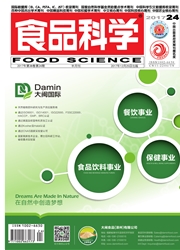

 中文摘要:
中文摘要:
本实验探讨瑞士乳杆菌对小鼠肠道微生物区系的影响,分析小鼠灌喂益生菌后肠道内各种微生物变化规律。研究将小鼠分成4组,日食对照组、生理盐水对照组、瑞士乳杆菌灌喂组和大肠杆菌灌喂组,连续灌喂15d,采集小鼠粪便利用选择性培养基对不同组别的小鼠肠道菌群作平板计数分析。研究结果表明,瑞士乳杆菌灌喂组与日食组和生理盐水组相比其肠道中乳酸菌类、双歧杆菌类、肠杆菌类、大肠杆菌类差异极显著(p〈O.01),肠球菌类含量具有显著性差异(p〈0.05);大肠杆菌灌喂组其肠道中乳酸菌类、双歧杆菌类、肠杆菌类、大肠杆菌类含量与对照组相比具有显著性差异(p〈0.05),而肠球菌类的分析结果显示变化差异不显著。研究证实了瑞士乳杆菌能够促进小鼠肠道内有益菌的显著增殖,而对肠道内过路菌和可疑致病菌均有一定的抑制作用,表明灌喂瑞士乳杆菌对小鼠肠道微生物区系具有一定的调节作用。
 英文摘要:
英文摘要:
This study aimed to investigate the effects ofLactobacillus helveticus on intestinal microflora in mice and analyze the variations regularity ofmicroflora after mice were administered with probiotics by gavage. Mice were randomly divided into four groups: normal group, normal saline as control, Lactobacillus helveticus group, and E.coli group. They were administered for 15 days (The normal group mice were fed like before). During the 15 days, the numbers of bacteria in the intestine of mice were counted. The numbers of Lactobacillus, BO'idobacterrim, Enterobacteria and E.coli in Lactobacillus helveticus group show extremely significant dfference to those in normal group and normal saline as control (19〈0. 01), and the number of Enterococcus shows significant difference (p〈0.05). Compared with control group, there is also significant difference (p〈0.05) on the numbers of the other bacteria except Enterococcus in E.coli group. Lactobacillus heIveticus can increase the number of probiotics and that of decrease harmful bacteria, so it can regulate the intestinal microflora in mice.
 同期刊论文项目
同期刊论文项目
 同项目期刊论文
同项目期刊论文
 期刊信息
期刊信息
